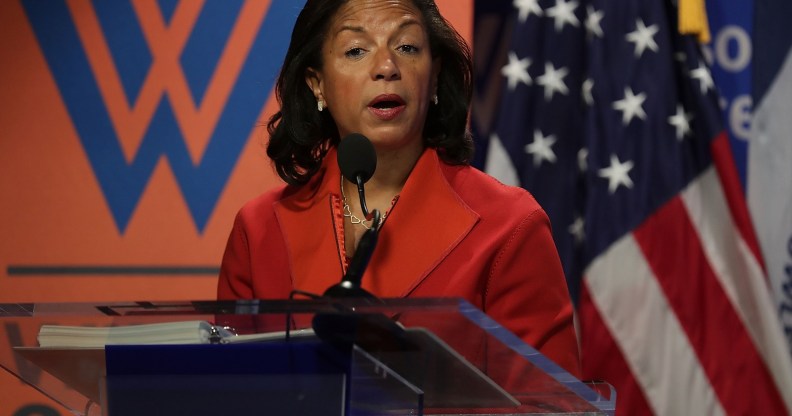Susan Rice: US must put LGBT rights at heart of foreign policy agenda

Barack Obama’s National Security Advisor has called for LGBT equality to be made central to US foreign policy.
Susan Rice is the former United States Ambassador to the United Nations and currently serves as President Obama’s National Security Advisor.
She gave an address on LGBT rights at DC’s American University yesterday, calling for greater US intervention.
Ms Rice said: “The United States must continue to integrate LGBT rights into our government and foreign policy.
“That includes creating a more diverse national security workforce. This is an issue that I’m particularly passionate about, and one that President Obama has prioritised.
“Because without tapping America’s full range of races, religions, ethnicities, social and economic experiences—without embracing people of every sexual orientation and gender identity—we’re leading in a complex world with one hand tied behind our back.
“The United States also needs to do more to institutionalise efforts to promote LGBT rights.
“As part of that commitment, I’m pleased to note that just yesterday a new rule went into effect that explicitly prohibits discrimination by USAID contractors.
“This rule means that any organisation that contracts with USAID must ensure that all people can benefit from its federally-funded programs, regardless of race, religion, disability—or sexual orientation and gender identity. It’s a major step towards ensuring that American assistance is provided in a fair and equitable manner.
“The United States must continue to stand up and speak out when the rights of LGBT people are threatened. Chad [Griffin, of Human Rights Campaign], as you put it, ‘Nations that place LGBT people in the cross hairs of danger must know that the United States will not turn a blind eye’.
“This is not merely to ‘name and shame’. It’s not about being self-righteous. It’s about leading the world to the recognition that in the 21st century, discrimination cannot be tolerated, and prejudice comes with a price.
“I don’t pretend that the United States has a perfect record. Hardly. And, yes, in service of our national security interests we sometimes engage with governments that do not respect the rights we hold most dear.
“But, I’m proud that when we’ve witnessed anti-LGBT violence or discrimination, the United States has put our opposition to this behaviour front and centre.
She also spoke about a case in which the US used influence on LGBT rights.
Ms Rice said: “A couple years ago, I had the privilege to meet with one of those advocates—a Ugandan LGBT activist named Frank Mugisha. Many of you know of him. I first heard of Frank when he led opposition to Uganda’s notorious ‘Anti-Homosexuality Act.’ A day after the law passed, a Ugandan tabloid published his picture in a list of ‘top 200 homos’, exposing Frank to grave personal risk.
“Shortly after that, sitting in my office in the West Wing, we discussed the situation he and other LGBT persons faced in Uganda, and how best the U.S. could support their efforts. Frank’s spoke softly but with vision and the moral authority that comes from standing up to persecution. I came away impressed by Frank’s eloquence and moved by his courage.
“This past August, Frank was attending a Pride Week event when the police raided the venue. They beat a number of trans people in attendance, forcibly touching them to establish their so-called #real gender’.
“Some participants were held at gunpoint. Frank himself was handcuffed and thrown into a police truck. Within 45 minutes of the raid, our team at the White House started receiving reports from civil society organizations, including the HRC.
“That same evening, the State Department organised an emergency call with the U.S. Embassy in Kampala. Our ambassador engaged the Ugandan government.
“The next day, I tweeted a photo of Frank and myself that we had taken during his visit to my office. Our message was unmistakable: the United States government cares. Within 24 hours, Frank and the other activists were released.
“We cannot give every case the attention we gave to Frank, as much as I wish we could. And, sometimes, our efforts are best served by raising our concerns privately. But, when a gay, civil society activist from a far-away country can be heard at the highest levels of the U.S. government, that itself is progress.
“When the United States can encourage another nation to do the right thing, together we are bending that arc of the moral universe ever so slightly towards justice.
“Yet, when countries enshrine homophobia and bigotry into law, when police abuse and arrest citizens simply for being who they are, when Frank’s friend and fellow advocate David Kato is bludgeoned to death with a hammer in his own home, we still have a great deal of work to do.”

